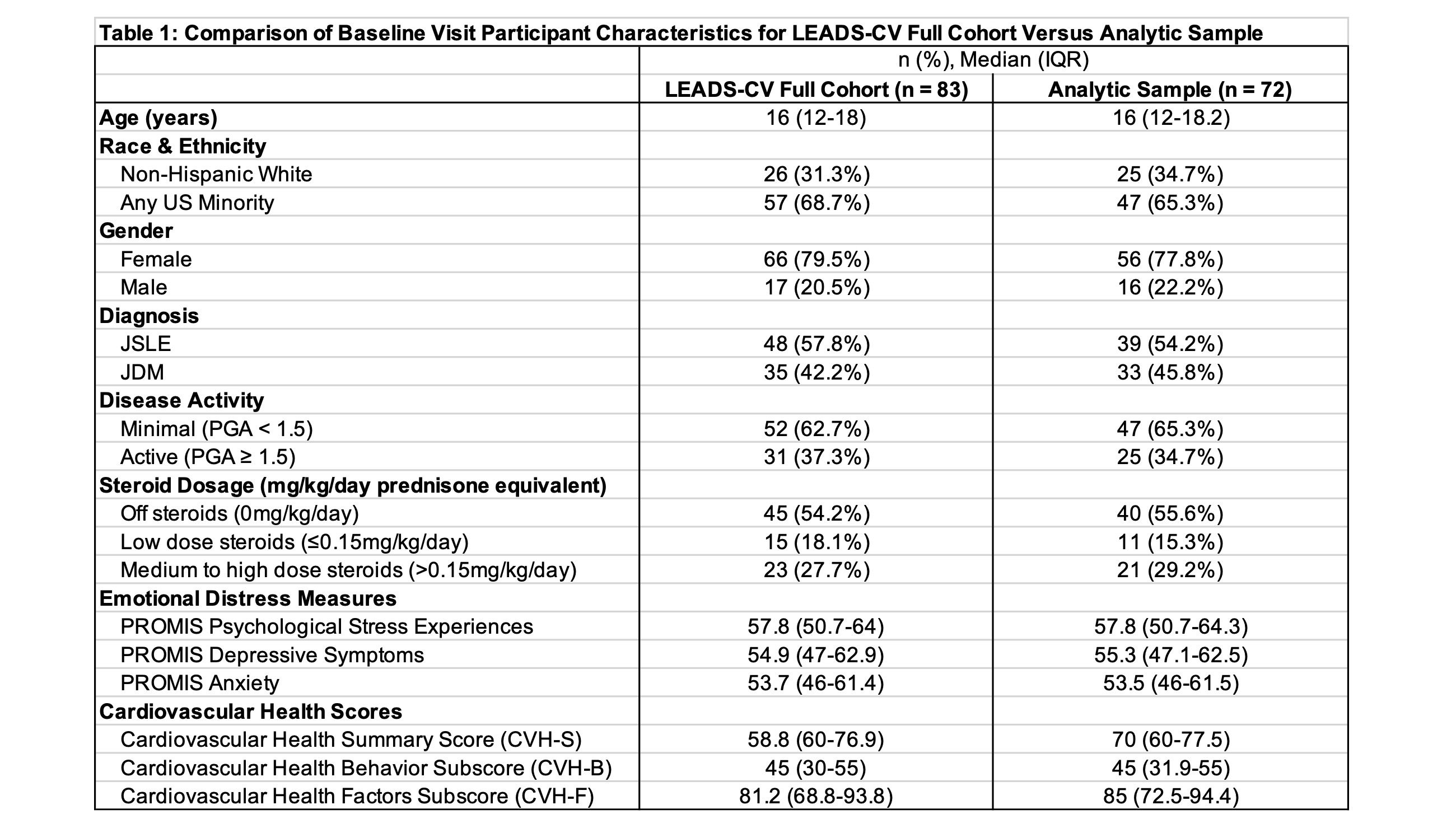Session Information
Session Type: Abstract Session
Session Time: 11:15AM-11:30AM
Background/Purpose: Juvenile lupus & dermatomyositis (JSLE/JDM) patients experience high emotional distress and premature loss of cardiovascular health (CVH), defined as protective factors against cardiovascular disease (CVD). Although general pediatric studies show emotional distress is associated with worse CVH, the contribution of emotional distress to suboptimal CVH in JSLE/JDM has not been studied. We present longitudinal analyses from the Lupus Erythematosus & Dermatomyositis Stress & Cardiovascular Health (LEADS-CV) cohort, the first multicenter biopsychosocial study assessing emotional distress and CVH in JSLE/JDM.
Methods: Of 83 LEADS-CV participants (5-22yo), 72 with non-missing data on study measures at ≥1 study visit (baseline, 6 & 12 months) were included for analysis. Emotional distress measures included PROMIS® Pediatric Psychological Stress Experiences, Depressive Symptoms, and Anxiety (self-report in ≥8yo, parent-report in 5-7yo). CVH Behaviors (diet quality screener, self-report ≥12yo, parent-report < 12yo; PROMIS Pediatric Physical Activity self-report ≥8yo, parent-report 5-7yo) and CVH Factors (body mass index, blood pressure, non-HDL cholesterol, HbA1c) were assessed. CVH Summary (CVH-S, all 6 indicators), Behaviors (CVH-B), and Factors (CVH-F) scores were determined using AHA guidelines (0 = very poor, 100 = ideal). Linear mixed-effects models (LMMs) assessed associations of emotional distress and CVH-S/-B/-F, adjusted for gender, race/ethnicity, diagnosis, disease activity, steroid use, and time. Growth mixture models (GMMs) identified latent trajectories of emotional distress and CVH-S/-B/-F. Proportions of patients in CVH-S/-B/-F latent trajectories were compared across emotional distress latent trajectories.
Results: LMM results (Table 2) show JSLE and active disease are associated with lower CVH-S and CVH-F scores across all models. Higher PROMIS Anxiety is associated with lower CVH-S and CVH-F. Increasing age is associated with lower CVH-B . Across models, slightly higher CVH-S was estimated at the 12-month visit compared with baseline. Among patients with maximal (79.8) vs minimal (38.8) PROMIS Anxiety scores, estimated CVH-S and CVH-F scores were lower (-7.79 and -10.25, respectively). GMMs identified latent trajectories of CVH and emotional distress with clinically distinct score distributions; worse CVH-S/-B/-F was more common in higher emotional distress latent trajectory classes, with 69-78% of patients in higher emotional distress latent trajectory classes having poor CVH-B (Table 3).
Conclusion: Higher emotional distress is associated with worse CVH in JSLE/JDM. Severe anxiety is associated with sufficiently large decreases in CVH-S/-F that higher mid-life risk of CVD events would be expected. Low CVH-B is present in most JSLE/JDM patients following high emotional distress latent trajectories. Interventions are needed to address dual risks of emotional distress and suboptimal CVH in JSLE/JDM. Our ongoing work will identify mediators by which emotional distress worsens CVH and child/parent targets for stress reduction and CVH promotion interventions in JSLE/JDM.
 Table 1: Comparison of Baseline Visit Participant Characteristics for LEADS-CV Full Cohort Versus Analytic Sample
Table 1: Comparison of Baseline Visit Participant Characteristics for LEADS-CV Full Cohort Versus Analytic Sample
.jpg) Table 2: Linear Mixed-Effects Models (LMM) (n = 72 with 171 observations)
Table 2: Linear Mixed-Effects Models (LMM) (n = 72 with 171 observations)
.jpg) Table 3: Latent Trajectory Classes of Emotional Distress and Cardiovascular Health in LEADS-CV Participants
Table 3: Latent Trajectory Classes of Emotional Distress and Cardiovascular Health in LEADS-CV Participants
To cite this abstract in AMA style:
Ardalan K, Davalos A, Hong H, Reeve B, Hornik C, Moody M, Lloyd-Jones D, Wu E, Ward A, Gbadegesin S, Sadun R, Dvergsten J, Covert L, Reed A, Connelly M, Schanberg L. High Emotional Distress Predicts Suboptimal Cardiovascular Health Among Patients with Juvenile-Onset Lupus and Dermatomyositis: Longitudinal Analysis of the Lupus Erythematosus and Dermatomyositis Stress and Cardiovascular Health Cohort Study [abstract]. Arthritis Rheumatol. 2025; 77 (suppl 9). https://acrabstracts.org/abstract/high-emotional-distress-predicts-suboptimal-cardiovascular-health-among-patients-with-juvenile-onset-lupus-and-dermatomyositis-longitudinal-analysis-of-the-lupus-erythematosus-and-dermatomyositis-str/. Accessed .« Back to ACR Convergence 2025
ACR Meeting Abstracts - https://acrabstracts.org/abstract/high-emotional-distress-predicts-suboptimal-cardiovascular-health-among-patients-with-juvenile-onset-lupus-and-dermatomyositis-longitudinal-analysis-of-the-lupus-erythematosus-and-dermatomyositis-str/
